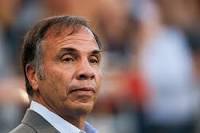Arena new head coach of the men’s national team
US national team has announced after the meeting room at the Marriott Marquis in the heart of Times Square, that Bruce Arena three-ring binder emblazoned with the USMNT crest containing detailed plans for his first months in charge.
With the other, he reached out to shake the hands of the reporters waiting to hear him map out his vision for a team shaken by two straight losses to start the Hexagonal andthe subsequent dismissal of Jurgen Klinsmann.
A little more than a week before, with pressure mounting following the death of Dos a Cero and an embarrassing loss to Costa Rica in San Jose, U.S. Soccer president Sunil Gulati had reached out to Arena, his friend of more than 30 years and the man he’d let go in 2006 following a disappointing showing at the World Cup. Might the LA Galaxy boss be interested in parachuting into the job despite recently signing a two-year contract extension, Gulati wondered.
In truth, Arena wasn’t just the first choice to take the reins of a program that found itself on shaky footing once again under Klinsmann: rather, he seemed like the only choice. The 65-year-old wouldn’t need an adjustment period, and he knew both the US soccer scene and volatility of CONCACAF qualifying like the back of his hand. Presumably, he’d hit the ground running.
A week before meeting with the press just miles from where he was born in Brooklyn, Arena had held court in another hotel lobby on the other side of the country. He arrived at The Belamar Hotel near his home in Manhattan Beach on that Tuesday morning armed with a player pool, depth chart and tentative January camp plans. US Soccer officials, meanwhile, brought with them the framework of a contract that would make him the head coach of the men’s national team.
It had taken a few days – and there was even a brief window when it appeared a deal might not get done – but Gulati, US Soccer CEO Dan Flynn and Arena hammered out an agreement. As the ink dried on the contract, Arena set up a meeting with the team administrator and booked a trip to Germany to meet with a cadre of regulars plying their trade in the Bundesliga.
A decade after his first stint as US boss ended in ignominy on a field in Nuremberg, Arena was all-in. He had a rare second chance to buff out the only real blemish on his coaching resume, and he didn’t plan on squandering it.
“When you have an opportunity to represent your country, you do it,” Arena explained in an exclusive interview with ExtraTime Radio. “When you’re called on, you do it. No second thoughts.”
“I didn’t have to do this,” he added. “I feel it’s my responsibility in the sport, given the opportunity to do it. I find it challenging and critically important for the growth of our sport.”
That responsibility carries with it the weight of a nation that’s qualified for seven straight World Cups and can’t afford for that streak to be broken.
Arena won’t usher in a tactical revolution or shuffle the player pool beyond recognition. He won’t complicate the game. He’ll communicate clearly. He’ll instill belief. He’ll give the group real purpose. He’ll keep it simple and the players will be asked to take ownership of what goes down on fields in Mexico City, San Pedro Sula, Port of Spain, Panama City and across the US.
They’ll be played in positions in which they’re most comfortable and effective, as long as that’s what’s best for the team. They’ll be held accountable, but they won’t be thrown under the bus. There will be a few who get another or a first-ever chance with national team, but not too many.
“Let’s be honest, there’s not going to be a whole lot of new faces,” Arena said. “We’re fighting for our lives starting March 24. We’re behind the eight ball, coming out of the gates with two losses. You don’t have a whole lot of time to be experimenting with players.”




